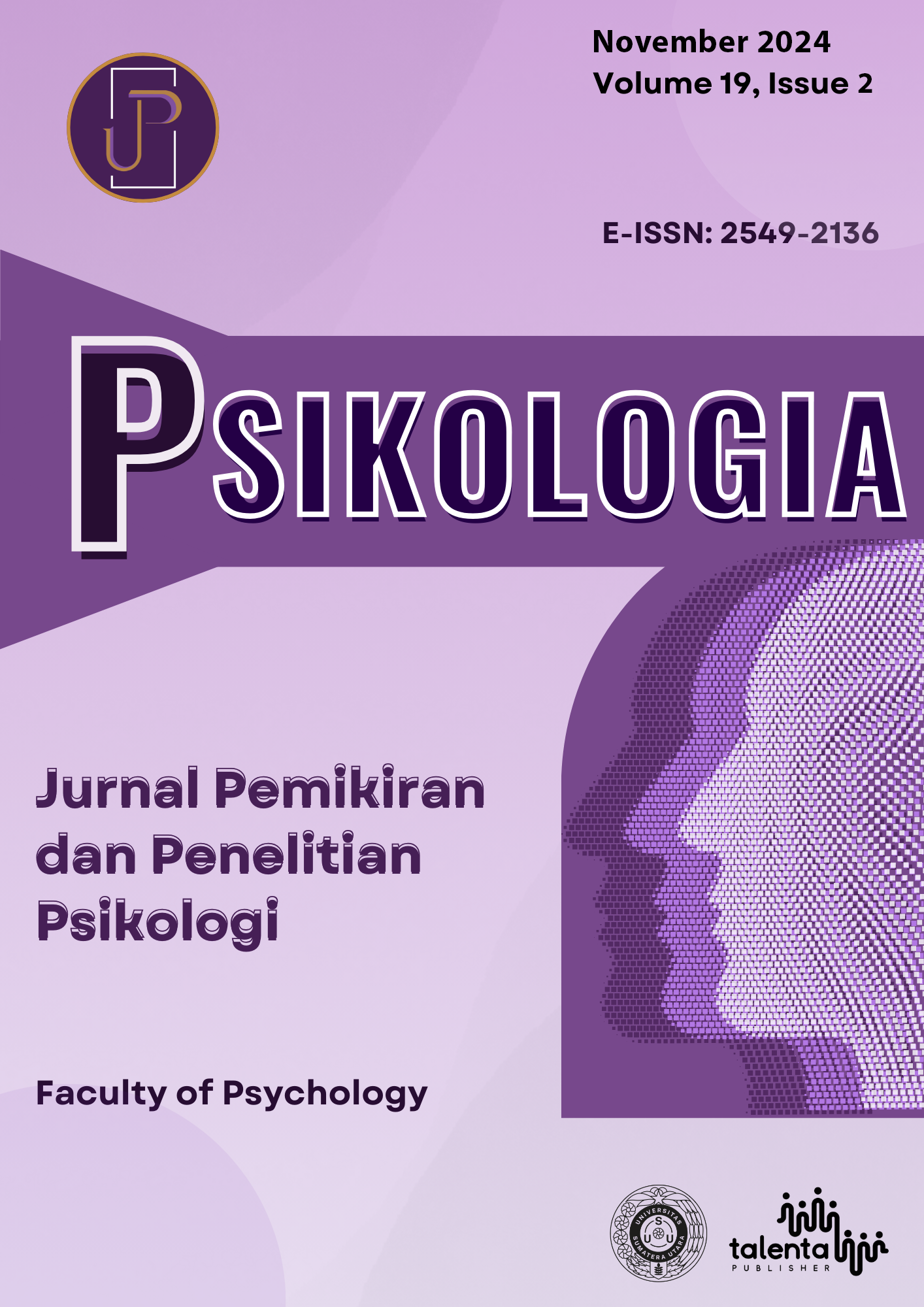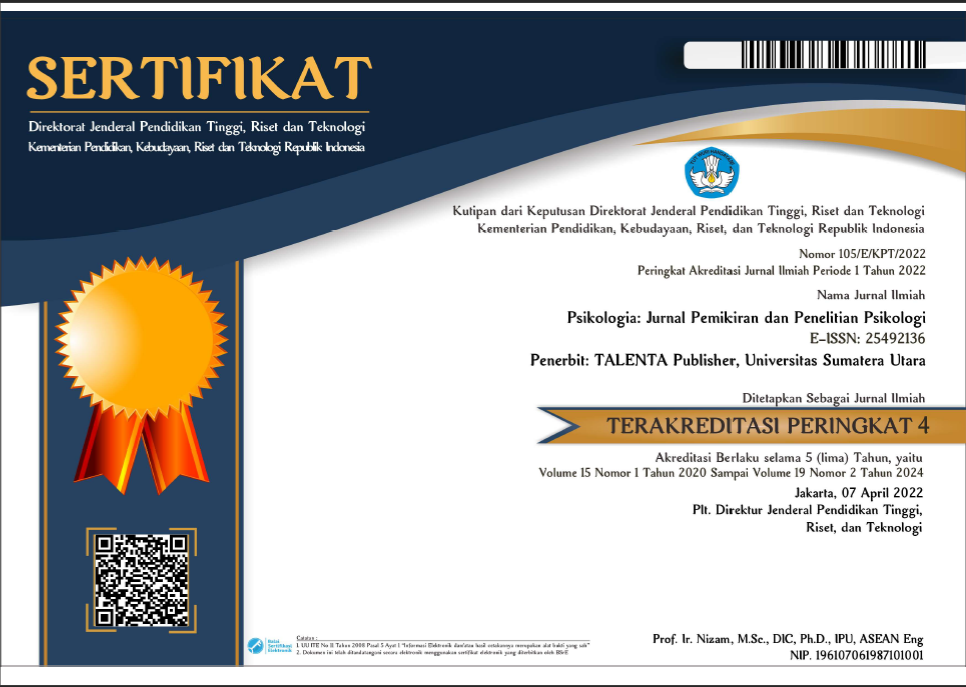Strategies for facing homesickness among non-local students in starting college at Airlangga University
DOI:
https://doi.org/10.32734/psikologia.v19i2.17204Keywords:
start of college, homesickness, strategies, studentAbstract
This study describes strategies for dealing with homesickness among non-local students at the beginning of college at Airlangga University. The phenomenon of homesickness in students occurs due to difficulty adjusting to a new environment in the early days of college. This research uses a qualitative approach with grounded theory research methods. The data collection technique used in-depth interviews with informants to determine the criteria for first-semester students migrating to Airlangga University. The results of this study explain that students tend to experience homesickness when they are in a boarding house alone and have no activity. The strategy of Non-local students in dealing with homesickness is to understand the conditions encountered, communicate with family or friends, and find activities to fill their free time.
Downloads
References
Bachri, B. S. (2010). Meyakinkan validitas data melalui triangulasi pada penelitian kualitatif. Jurnal Teknologi Pendidikan, 10(1), 46-62.
Corbin, J. M., & Strauss, A. (1990). Grounded theory research: Procedures, canons, and evaluative criteria. Qualitative Sociology, 13(1), 3–21. https://doi.org/10.1007/BF00988593
English, T., Davis, J., Wei, M., & Gross, J. J. (2017). Homesickness and adjustment across the first year of college: A longitudinal study. Emotion, 17(1), 1–5. https://doi.org/10.1037/emo0000235
Gross, J. (1998). The emerging field of emotion regulation: An integrative review. Review of General Psychology, 2(3), 271-299.
Gross, J., & John, O. P. (2003). Individual differences in two emotion regulation processes: implication for affect, relationship, and well being. Journal of Personality and Social Psychology, 85(2), 348-362. doi:https://doi.org/ 10.1037/0022-3514.85.2.348
Hansen, S. (2020). Investigasi teknik wawancara dalam penelitian kualitatif manajemen konstruksi. Jurnal Teknik Sipil: Jurnal Teoritis dan Terapan Bidang Rekayasa Sipil, 27(3), 283-299. https://doi.org/10.5614/jts.2020.27.3.10
Istanto, T. L., & Engry, A. (2019). Hubungan antara dukungan sosial dan homesickness pada mahasiswa rantau yang berasal dari luar Pulau Jawa di Universitas Katolik Widya Mandala Surabaya Kampus Pakuwon City. Experientia Jurnal Psikologi Indonesia, 7(1), 19-30. doi:10.33508/exp.v7i1.2120
Kristiana, I. F., Suryanto, & Hendriani, W. (2019). How to make grounded the preferred approach to psychological research? A systematic review. Journal od Educational, Health and Community Psychology, 8(3), 276-291. https://doi.org/10.12928/jehcp.v8i3.11522
Kumar, S., & Bhukar, J. (2013). Stress level and coping strategies of college students. Journal of Physical Education and Sports Management, 4(1), 5-11. doi:https://doi.org/10.5897/JPESM12.001
Lazarus, R., & Folkman, S. (1984). Stress, Appraisal, and Coping. New York: McGraw-Hill.
Mariska, A. (2018). Pengaruh penyesuaian diri dan kematangan emosi terhadap homesickness. Psikoborneo, 6 (3), 310-316.
Maryam, S. (2017). Strategi coping: Teori dan sumberdayanya. Jurnal Konseling Andi Matappa, 1(2), 101-107.
Mozafarinia, F., & Tavafian, S. S. (2014). Homesickness and coping strategies among international students studying in University Technology Malaysia. Mdrsjrns, 2(1), 53–61.
Nauta, M. H., Aan Het Rot, M., Schut, H., & Stroebe, M. (2020). Homesickness in social context: An ecological momentary assessment study among 1stâ€year university students. International Journal of Psychology, 55(3), 392–397. https://doi.org/10.1002/ijop.12586
Nusi, P., Murdiana, S., & Siswanti, D. N. (2022). Homesick ditinjau dari gaya kelekatan secure dan insecure pada mahasiswa rantau. Jurnal Psikologi Talenta Mahasiswa, 2(1), 2-10.
Palai, P., & Kumar, P. (2016). Relationship among stress, adjustment and homesickness in university students. International Journal For Innovative Research In Multidisciplinary Field, 2(6), 101–106.
Pragholapati, A., & Ulfitri, W. (2019). Gambaran mekanisme coping pada mahasiswa program studi sarjana keperawatan Tingkat IV yang sedang menghadapi tugas akhir di Sekolah Tinggi Ilmu Kesehatan X Bandung. Humanitas (Jurnal Psikologi), 3(2), 115–126. https://doi.org/10.28932/humanitas.v3i2.2168
Prasetio, C. E., Sirait, E. G. N., & Hanafitri, A. (2020). Rumah, Tempat Kembali: Pemaknaan Rumah pada Mahasiswa Rantau. Mediapsi, 6(2), 132–144. https://doi.org/10.21776/ub.mps.2020.006.02.7
Putri, H. W., Priyatmono, A. F., & Setiawan, W. (2023). Analisis Hubungan Antara Perasaan Homesickness pada Mahasiswa Rantau Terhadap Keberadaan Fasilitas Indekos. SIAR IV, 964-973.
Saravanan, C., Alias, A., & Mohamad, M. (2017). The effects of brief individual cognitive behavioural therapy for depression and homesickness among international students in Malaysia. Journal of Affective Disorders, 220, 108–116. https://doi.org/10.1016/j.jad.2017.05.037
Shasra, S. F. (2022). Gambaran homesickness siswa baru di pondok pesantren. Nusantara: Jurnal Ilmu Pengetahuan Sosial, 9(4), 1247-1252.
Stroebe, M., Schut, H., & Nauta, M. H. (2016). Is homesickness a mini-grief? Development of a dual process model. Clinical Psychological Science, 4(2), 344–358. https://doi.org/10.1177/2167702615585302
Sun, J., Hagedorn, L. S., & Zhang, Y. (Leaf). (2016). Homesickness at college: Its impact on academic performance and retention. Journal of College Student Development, 57(8), 943–957. https://doi.org/10.1353/csd.2016.0092
Thurber, C. A., & Walton, E. A. (2012). Homesickness and Adjustment in University Students. Journal of American College Health, 60(5), 415–419. https://doi.org/10.1080/07448481.2012.673520
Downloads
Published
How to Cite
Issue
Section
License
Copyright (c) 2024 Haztika Jihadania Asdhar & Suryanto

This work is licensed under a Creative Commons Attribution-ShareAlike 4.0 International License.









